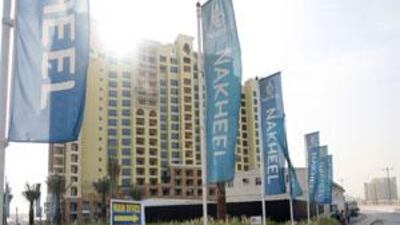Sheikh Mohammed bin Rashid, Vice President of the UAE and Ruler of Dubai, yesterday appointed two men, his top financial official and a government banker who specialises in selling property loans, to run the new fund distributing US$20 billion (Dh73.46bn) in emergency funds to government-related companies.
Sheikh Mohammed issued a royal decree naming Abdul Rahman al Saleh, the director general of Dubai's Department of Finance, as the chairman of the Dubai Financial Support Fund, which was established last month. To head the fund's day-to-day operations, he named Marwan Iqbal Abedin, who until recently was director of marketing and originations at the Emirates National Securitisation Corporation, or ENSEC, a government-controlled investment bank that sells mortgage-backed securities and other complex debt obligations.
"The Dubai Financial Support Fund is central to the achievement of Dubai's long-term strategy for economic growth," said Mr al Saleh in a statement accompanying the announcement. "The new board's primary duty will be to prepare and adopt the criteria to be used in the allocation of funds for Dubai's strategic revenue-generating projects." Dubai has already borrowed $10bn from the Central Bank and plans to issue bonds to raise $10bn more, as it races to keep key infrastructure projects rolling and make payments on an estimated $80bn in debt in the face of falling property prices and tight credit.
Residential property prices in Dubai have fallen about 30 per cent since their peak last September, according to data from Reidin.com, which compiles transactions registered with the Dubai Land Department. The slump has contributed to a dramatic slowdown in economic growth across the UAE, with economists predicting the economy will shrink slightly this year amid lower oil prices and rising unemployment in the property and construction sector.
Sheikh Mohammed also announced the other members of the fund's board, including its deputy chairman, Abdul Aziz al Muhairi, the managing director of the Investment Corporation of Dubai; Mattar Mohammed al Tayer, the chairman and executive director of Dubai's Roads and Transport Authority; Majid al Ghurair, the chairman of Shuaa Capital; and Riad Mohammed Khalfan Belhoul as legal counsel. The fund will report to Dubai's Supreme Fiscal Committee, which is headed by Sheikh Ahmed bin Saeed Al Maktoum, the chairman of Emirates Group. The committee includes Mr al Saleh and Mohammed al Shaibani, the chief executive of the Investment Corporation of Dubai.
Mr Abedin, the fund's new executive director, is a relative unknown. A former Merrill Lynch banker, he was at ENSEC in 2005 when it announced the UAE's first AAA-rated, asset-backed securitisation, which was $350 million of notes backed by mortgages owed by buyers of villas, townhomes and apartments at Nakheel's Palm Jumeirah, where prices have fallen more than 60 per cent from their peak. The mortgages were issued by Tamweel, formerly one of the UAE's two largest home lenders. Tamweel ceased lending operations last November and remains inactive pending a decision by the Government on whether to merge it with its fellow mortgage lender, Amlak Finance.
Nakheel is now expected to be one of the first recipients of the fund's attention. Nakheel has $3.5bn in Islamic bonds due in December. Whether Dubai intends to pay the bond in full, and if so whether it will raise the cash by borrowing it or selling off assets, have been key questions among bankers and investors. The ENSEC securitisation was the same kind of mortgage-backed instrument that in the US created the subprime crisis in 2007, in spite of their top credit ratings.
But analysts and economists in the UAE have called for the creation of an agency such as ENSEC that could buy mortgages from banks so they will have more cash to lend to the nation's credit-starved property market. Whether Mr Abedin's appointment means that the Financial Support Fund would try to raise cash by securitising government-controlled assets, such as mortgages or cash flows on property, remains unclear.
In addition to administering what remains from Dubai's first $10bn from its bond issue bought by the Central Bank, the fund will be in charge of the next $10bn bond sale and has broad authority to issue more debt on behalf of the Dubai Government if it is needed. ENSEC is partly owned by Istithmar, a wholly owned subsidiary of government-owned Dubai World, which also owns Nakheel. Mr Abedin has also served on Istithmar's board of directors. ENSEC's other major shareholder, the Dubai Islamic Bank, is controlled by government-owned Investment Corporation of Dubai.
"The Dubai Financial Support Fund has been mandated to act as an independent entity to ensure that the projects we recommend for loans are fully aligned with Dubai's economic growth strategy," Mr Abedin said in the announcement. "The process and the criteria for the assessment of loan applications will be robust and transparent." Investors have been eager to know just how the new fund will distribute its support, but when he announced the fund, Mr al Saleh said it would leave it up to recipient companies to disclose whether they had received any money and under what terms.
Mr Abedin reiterated that point in yesterday's announcement, saying: "The loans will be made on a commercial basis, and it will be up to each recipient of the financial support whether to disclose the extent of its borrowing from the Support Fund."
warnold@thenational.ae

